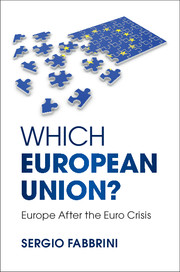Book contents
- Frontmatter
- Dedication
- Contents
- List of boxes
- List of figures
- List of tables
- List of abbreviations
- Preface – How many unions?
- Acknowledgments
- Part I Institutionalization of multiple unions
- Part II Main perspectives on the European Union
- 4 The perspective of the economic community
- 5 The perspective of intergovernmental union
- 6 The perspective of parliamentary union
- Part III Towards the compound union perspective
- Appendix
- Glossary
- References
- Index
6 - The perspective of parliamentary union
Published online by Cambridge University Press: 05 March 2015
- Frontmatter
- Dedication
- Contents
- List of boxes
- List of figures
- List of tables
- List of abbreviations
- Preface – How many unions?
- Acknowledgments
- Part I Institutionalization of multiple unions
- Part II Main perspectives on the European Union
- 4 The perspective of the economic community
- 5 The perspective of intergovernmental union
- 6 The perspective of parliamentary union
- Part III Towards the compound union perspective
- Appendix
- Glossary
- References
- Index
Summary
An important means to deepen the pan-European political debate would be the presentation by European political parties of their candidate for the post of Commission President at the European Parliament elections
José Manuel Barroso, President of the European Commission, September 12, 2012Introduction
Having recognized the unsatisfactory performance of intergovernmental union, it is now time to discuss the alternative perspective advanced for promoting a political union. The perspective of parliamentary union continues to be the mainstream alternative to intergovernmental union, advanced by very influential scholarship with roots in the neo-functional school of European integration that promoted the “Community method” of integration. And, of course, it has been the most popular perspective among officials working in the supranational institutions of the EU in Brussels. Its salience has increased with the deepening of the euro crisis and the difficulty experienced by the intergovernmental institutions in taming it. It is based on the assumption that, without becoming a parliamentary federation with the Commission acting as a federal government elected and controlled by the EP or its majority, the EU will never truly resolve the euro crisis. One can even argue (as the Spinelli Group and Bertelsmann Stiftung (2013) did) that the euro crisis has been the dramatic but welcome opportunity for relaunching the federal project frozen after the failure of the CT in 2005.
This perspective consists in “the ambition to establish … a system of government at the European level with a strong priority-setting and policy-planning input for the EP, a system that in a way would resemble mutatis mutandis parliamentary democracy in a nation-state” (Lehmann and Schunz 2005: 10). At its core there is the strengthening of the political relations between the EP and the Commission. Although there are several definitions of parliamentarism, its crucial feature resides in the fact that “the head of the government … and his or her cabinet are dependent on the confidence of the legislature and can be dismissed from office by a legislative vote of no confidence or censure” (Lijphart 1992: 2).
- Type
- Chapter
- Information
- Which European Union?Europe After the Euro Crisis, pp. 153 - 184Publisher: Cambridge University PressPrint publication year: 2015



